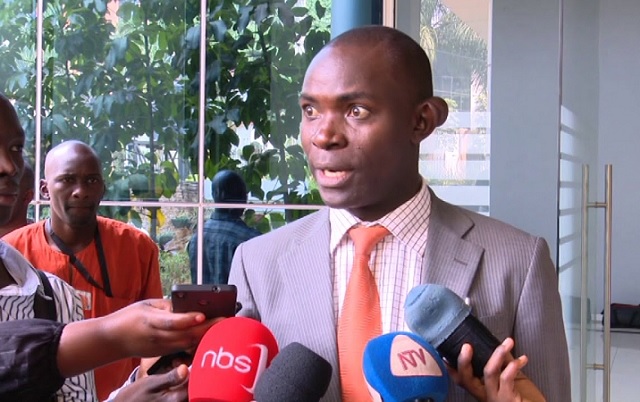BY URN
KAMPALA-UGANDA/NEWSDAY: Anti-Corruption court judge, Lawrence Gidudu, has today Monday tasked city lawyer Male Mabirizi to reveal the source of an internal memo that led to the arrest and subsequent prosecution of ministers implicated in the Karamoja iron sheets scandal.
Mabirizi was referring to the memo while arguing before the judge in an application seeking to nullify the investigations, arrests, and prosecutions of the implicated politicians. He argued that the focus should be on holding the technical people and accounting officers, particularly in the Office of the Prime Minister (OPM) accountable instead of targeting politicians.
In response, Mabirizi stated that he was not required to reveal his source since it was a public document. He pointed out that citizens have the constitutional right to access any documents held by the state, citing a previous court decision involving Gen David Tinyefuza, now known as Sejusa.
In that 1998 case, a military message, which is typically confidential, was used to cross-examine Amama Mbabazi, the former minister of Defense, without the source being revealed.
However, the judge informed Mabirizi that he would be the one to make a ruling on the application, disregarding his argument based on the law. Mabirizi attempted to clarify that the memo was authored by the minister for Karamoja Affairs, Mary Gorreti Kitutu, and addressed to the accounting officer in OPM.
The judge insisted on his authority to make a decision on the matter, while Mabirizi emphasized the need for the judge to consider the law before reaching a decision. Eventually, the judge instructed Mabirizi to proceed with his submissions and present his case.
According to court records, the contentious memo was written by Kitutu on January 12, 2023, to the accounting officer, requesting the release of 12,200 pieces of iron sheets for the vulnerable groups in the Karamoja region under the Affirmative Action Programme.
It is alleged that the iron sheets were released but misappropriated, ending up in the hands of different individuals. As a result, charges have been filed against minister Kitutu, her junior minister Agnes Nandutu, state minister for Finance and Economic Planning Amos Lugoloobi, and others who are still at large.
On April 17, 2023, Mabirizi petitioned the Anti-Corruption court, seeking to nullify the piecemeal investigations, arrests, detentions, and prosecutions carried out by the police, director of public prosecutions, or any other state agency related to the memo.
Mabirizi argued that, under the law, the vice president, ministers, speakers, and local government leaders should not be held accountable for matters regarding accounting, as they are responsible for making policies rather than accounting matters.
Mabirizi further stated that continuing to prosecute the political heads would lead to the government imprisoning individuals with limited accounting knowledge, while technical experts responsible for accountability would go unpunished.
He emphasized that the law was designed to prevent the victimization of the political class, and the accounting officers should be the ones facing arrest. In response, the judge questioned Mabirizi about the appropriate course of action if a minister requests iron sheets or other property, as it would involve accounting.
Mabirizi suggested that they should be asked to return the property, and failure to do so should result in civil proceedings instead of criminal charges. Mabirizi argued that according to the law, if there is evidence against a person, it should be gathered in a single file instead of scattering files in different courts.
Mabirizi noted the existence of multiple files stemming from a single internal memo, which he argued goes against the principle of double jeopardy. However, the judge disagreed, stating that this principle only applies to an individual who has already been convicted or acquitted. The disagreement led to the judge reminding Mabirizi to be respectful in his responses.
“When you say no, Mr Mabirizi, do it with due respect. I’m a judge of the High court of Uganda. I didn’t choose to be a businessman like you described yourself. I believe you lack respect, especially considering your previous jail term,” said Gidudu.
Mabirizi, visibly emotional, responded that even his previous jail term was a violation of his human rights, and he has since challenged it, confident that it will be overturned. The judge then asked Mabirizi who would quash his sentence, to which Mabirizi insisted that the courts of law themselves would rectify the matter.
To defuse the tension and anger displayed by Mabirizi, the judge lightened the mood by jokingly stating that it was fortunate they had met and thanked Mabirizi for providing references for him to review while making his decision.
On their part, the attorney general and the DPP, the only respondents in this case, requested the court to dismiss Mabirizi’s application, arguing that it lacked merit and that Mabirizi did not have the authority to file it on behalf of the accused persons.
Principal state attorney Peter Masaba stated that the arrests, interrogations, and prosecutions did not violate the constitution or any legislation because the politicians were being charged as individuals, not due to their offices.
He further argued that the DPP and police were carrying out their statutory duties, and the prosecutions were based on sufficient evidence to warrant a trial. According to Masaba, the investigations and prosecutions were being conducted systematically, rather than in a piecemeal manner. The judge has adjourned the case until May 24 for further hearing.
Do you want to share a story, comment or opinion regarding this story or others, Email us at newsdayuganda@gmail.com Tel/WhatsApp........0726054858







Discussion about this post